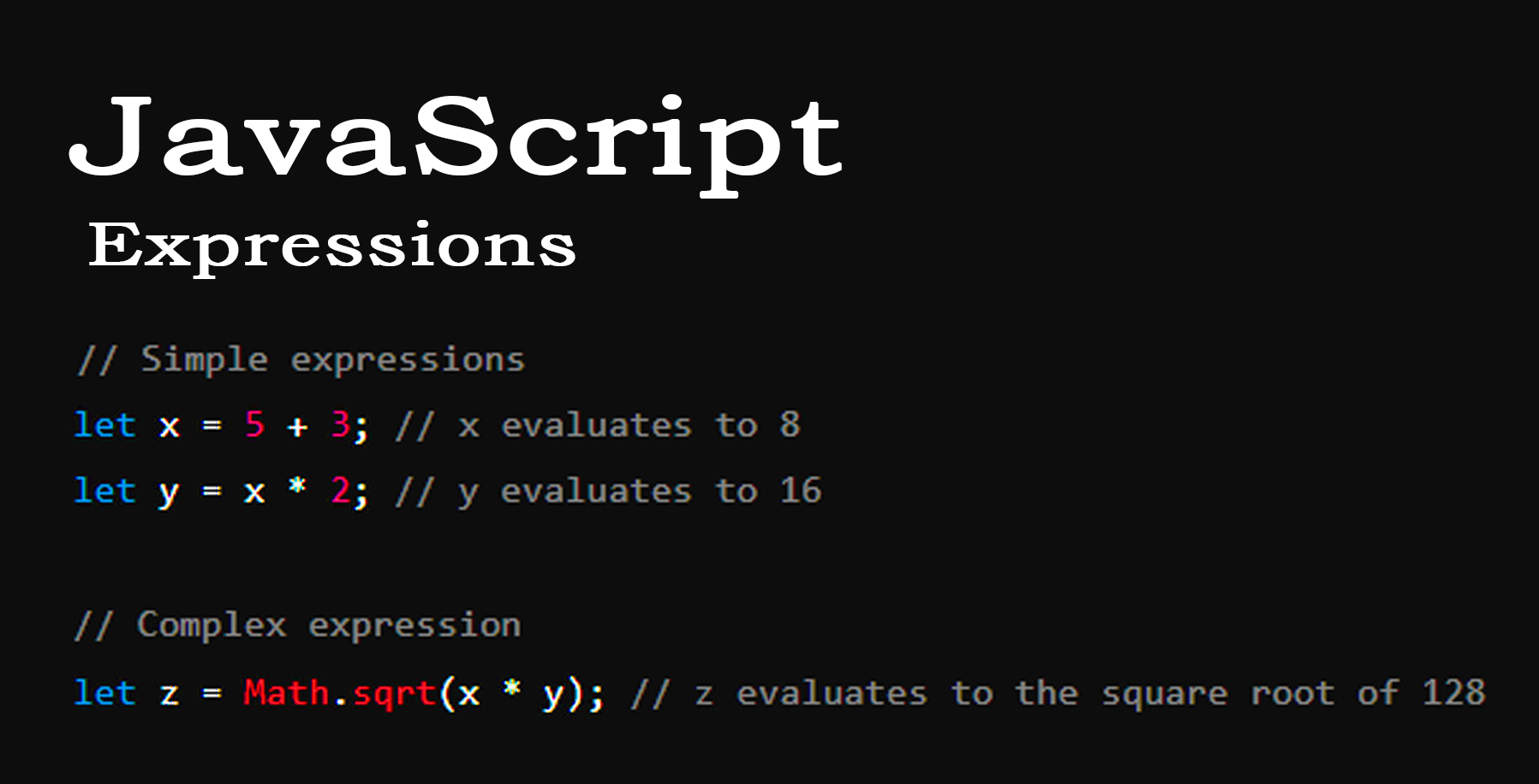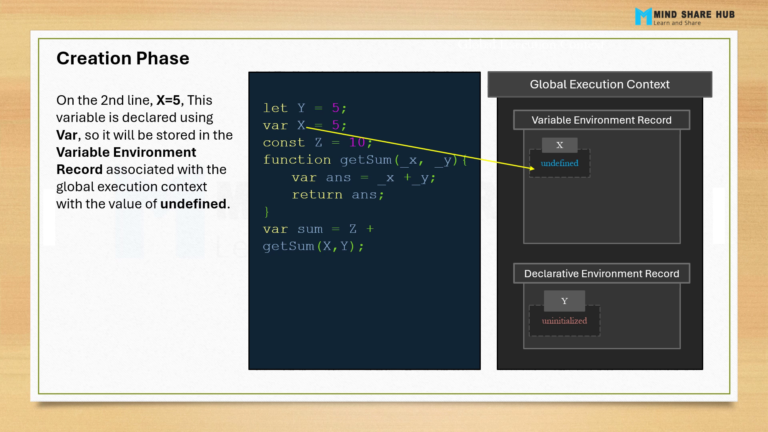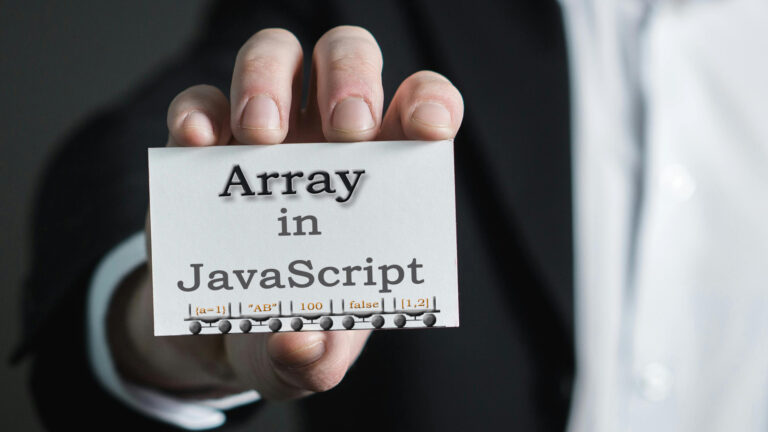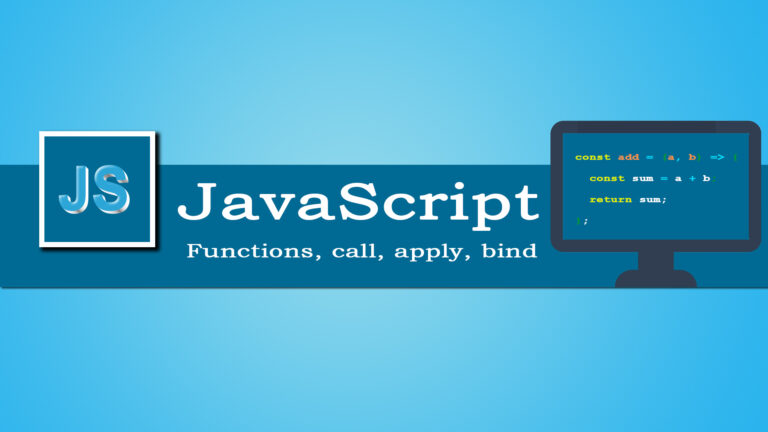What are Expressions in JavaScript?
In simple terms, an expressions in JavaScript are snippets of code that evaluate to a value. This value could be of any type, such as a number, string, object, or even a function. Expressions can be as simple as a single variable or constant, or as complex as a function call or a series of operations.
// Simple expressions
let x = 5 + 3; // x evaluates to 8
let y = x * 2; // y evaluates to 16
// Complex expression
let z = Math.sqrt(x * y); // z evaluates to the square root of 128Types of Expressions in JavaScript
- Primary Expressions
- Arithmetic Expressions
- String Expressions
- Logical Expressions
- Conditional (Ternary) Expressions
- Object and Array Expressions
- Function Expressions
- Assignment Expressions
1. Primary Expressions
Primary expressions are the simplest expressions in JavaScript, consisting of basic keywords, variables, literals, and constants.
let name = 'John';
//Keywords
this; // Refers to the current context
null; // Represents the absence of a value
undefined; // Indicates an uninitialized variable
//Literals
10; // A numeric literal expression
'Hello'; // A string literal expression
true; // A Boolean literal expression2. Arithmetic Expressions
Arithmetic expressions perform mathematical operations and return a numeric value. These include addition, subtraction, multiplication, division, and more.
let a = 10;
let b = 5;
let result = a + b; // result is 15
result = a - b; // result is 5
result = a * b; // result is 50
result = a / b; // result is 2
result = a % b; // result is 0 (remainder)3. String Expressions
String expressions involve operations on strings, such as concatenation.
let greeting = 'Hello' + ' ' + 'World!'; // Concatenation
let name = 'JavaScript';
let message = `Hello, ${name}!`; // Using template literals4. Logical Expressions
Logical expressions return a Boolean value (true or false). These involve logical operators such as && (AND), || (OR), and ! (NOT).
let isAdult = age > 18 && age < 60; // True if age is between 18 and 60
let isWeekend = day === 'Saturday' || day === 'Sunday'; // True if the day is a weekend
let isNotTrue = !true; // Negates the boolean value, resulting in false5. Comparison Expressions
Comparison expressions compare two values and return a Boolean result. These involve operators like ==, ===, !=, >, <, >=, and <=.
let isEqual = (5 == '5'); // True because '==' compares values loosely
let isStrictEqual = (5 === '5'); // False because '===' compares both value and type
let isGreater = (10 > 5); // True because 10 is greater than 56. Assignment Expressions
Assignment expressions assign values to variables using operators like =, +=, -=, etc.
let x = 10; // Assigning 10 to x
x += 5; // Equivalent to x = x + 57. Conditional (Ternary) Expressions
A ternary expression is a shorthand for the if...else statement and returns one of two values based on a condition.
let age = 20;
let canVote = (age >= 18) ? 'Yes' : 'No'; // Returns 'Yes' if age is 18 or more8. Function Expressions
In JavaScript, functions can also be expressions. A function expression defines a function within an expression and can be stored in a variable.
let square = function(num) { return num * num; };
let result = square(5); // 25
//Arrow functions, introduced in ES6, provide a more concise syntax:
let square = (num) => num * num;
let result = square(5); // 25To know more about the function Expressions, click here.
9. Object and Array Expressions
Objects and arrays can also be created using expressions.
//Object Expressions:
let person = {
name: 'John',
age: 30
};
//Array Expressions:
let numbers = [1, 2, 3, 4];10. Invocation Expressions
These involve calling a function or method using parentheses.
function greet(name) {
return `Hello, ${name}!`;
}
let message = greet('JavaScript'); // Calls the greet function with 'JavaScript' as an argumentConclusion
Expressions are the building blocks of JavaScript, allowing developers to create dynamic and interactive web applications.




